Field trip to Malarkey’s Portland shingle plant!
January 23, 2025 at 3:00 p.m.By Emma Peterson.
The Coffee Shops crew got a chance to see innovation and sustainability in action during their tour of Malarkey’s Portland location.
Some people might say Friday the 13th is unlucky, but Friday, December 13 was the opposite for The Coffee Shops crew that got to visit Malarkey Roofing Products' Portland, Oregon manufacturing plant! This plant was founded in the 1956 and boasts over 160 full-time employees (or equivalent). It is one of four Malarkey locations (not counting the newest plant they just broke ground on in Franklin, Indiana and the fiberglass mat facility that just broke ground in Maryland) and is the only one that manufactures both fiberglass mat and shingles in one spot.
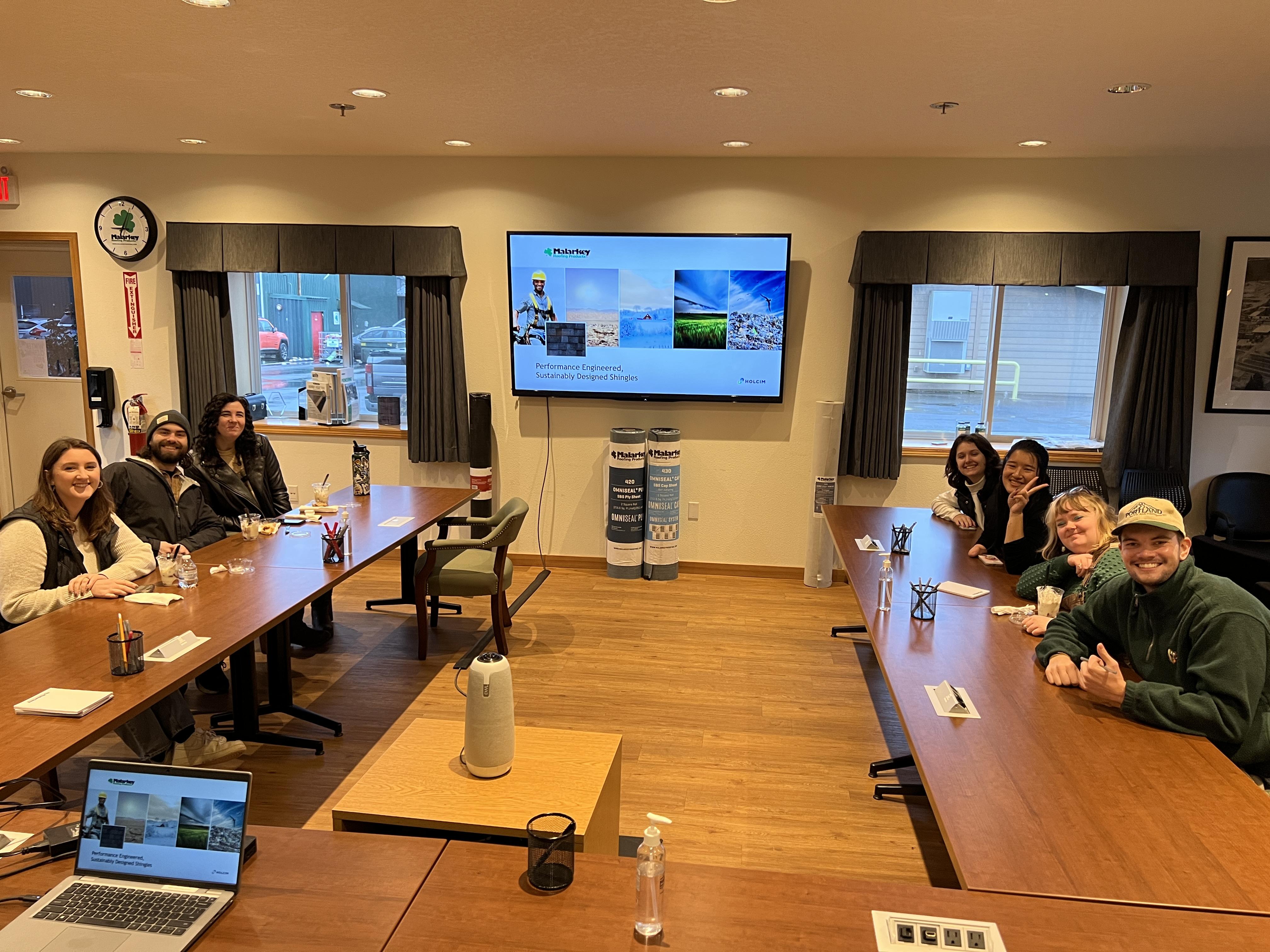 The day we got to visit, the plant was quieter than normal. 11 months out of the year it operates 24 hours a day, 7 days a week, but near the holidays they shut down for one month to perform maintenance on all the machinery. When we arrived, Mike Fields (senior director of sales who has worked at Malarkey since 2015), Rachel Garcia (been with Malarkey since 2012 and is their director of contractor services) and Zoe Kelly (a senior executive sales manager who has worked for Malarkey since 2023) greeted us at their front office.
The day we got to visit, the plant was quieter than normal. 11 months out of the year it operates 24 hours a day, 7 days a week, but near the holidays they shut down for one month to perform maintenance on all the machinery. When we arrived, Mike Fields (senior director of sales who has worked at Malarkey since 2015), Rachel Garcia (been with Malarkey since 2012 and is their director of contractor services) and Zoe Kelly (a senior executive sales manager who has worked for Malarkey since 2023) greeted us at their front office.
History of innovation
Our tour began in that same office with an engaging presentation from Rachel and Mike. They shared a short history of Malarkey and their work in the industry. One of the things that stood out was their commitment to continual innovation and improving the industry for both homeowners and contractors. They were the first to lay organic fiberglass mat machine in Western North America back in the 1970s and then the first to introduce a polymer modified 3-tab roofing shingle in 1986 (fun fact: our president, Heidi J. Ellsworth shared that this is the current shingle on her roof!).
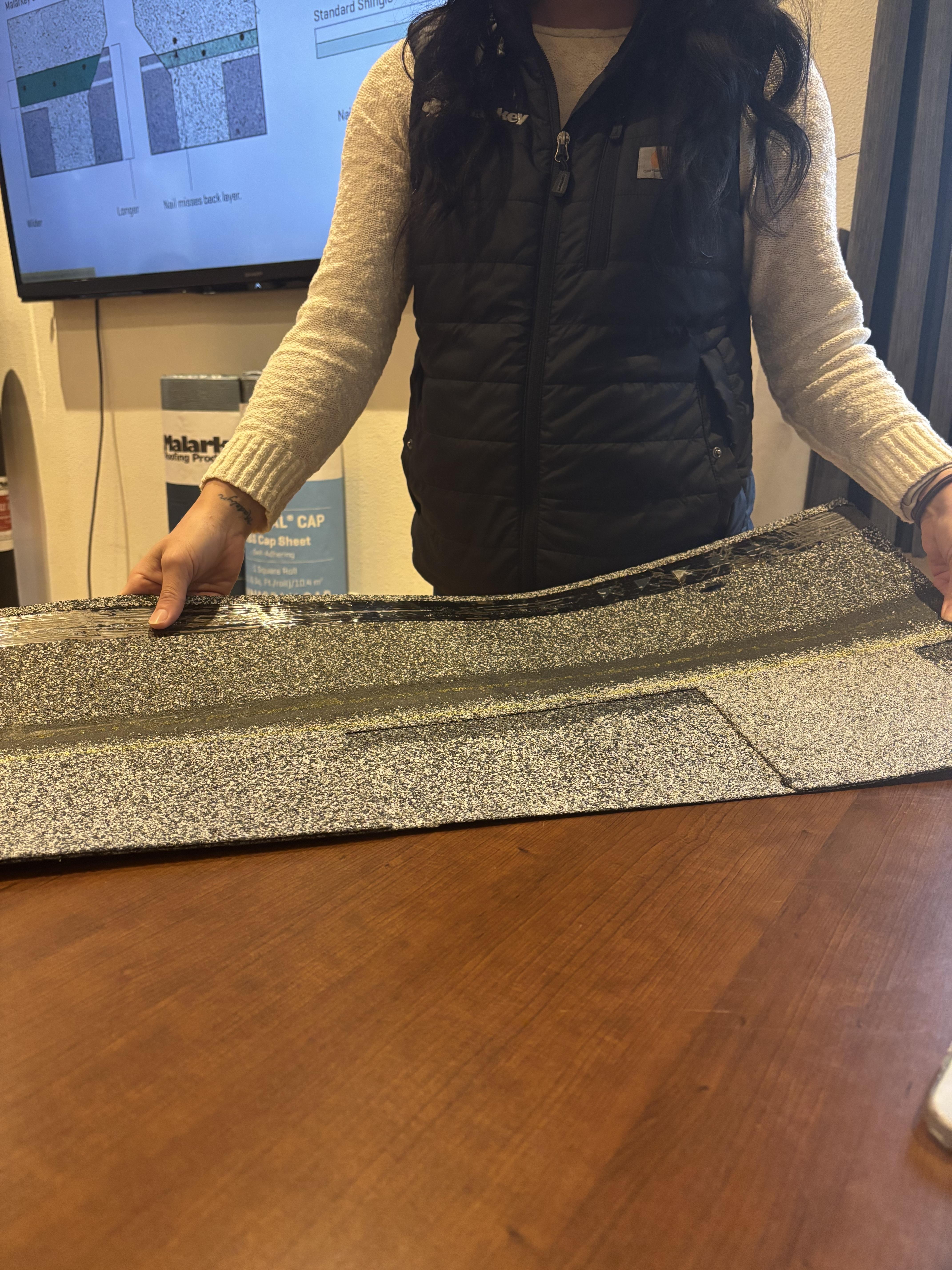 They carried this pattern of incredible innovation through the decades, with too many firsts for us to name here! But 2001 brought a whole new level of innovation when Malarkey introduced the first wider nailing area on a shingle, The Zone®.
They carried this pattern of incredible innovation through the decades, with too many firsts for us to name here! But 2001 brought a whole new level of innovation when Malarkey introduced the first wider nailing area on a shingle, The Zone®.
This is a patented design that includes two rain seals/adhesive strips (usually there is one), a larger nailing zone (1-5/16 wide") and a tapered edge via scraped off granules. All of this works to create a more flat, more secure roof that avoids wind blow off, installs faster and avoids voiding warranties for missing the nails in the zone.
Hannah Ford, one of The Coffee Shops’ interns, found this especially interesting and shared, “Learning about the Zone and the shingle comparisons was the highlight of my trip! It really shows how Malarkey manufactures shingles with the roofer in mind.”
And they have not slowed down on their innovation in recent years. All of us from The Coffee Shops were excited to get a sneak preview into the future of roofing when Mike and Rachel shared about Malarkey’s RFID roofing technology. Currently only manufactured in their plant in Oklahoma, this technology places an RFID tag in every four squares of roofing. These hold information about what type of shingle it is (color, brand) and tells the scanner when and where it was built. This is helpful for inspectors who can take a scanner up on the roof and know exactly what material they are looking at. It also helps Malarkey see what issues might be cropping up and trace it back to production to find a way to improve the process to avoid further issues.
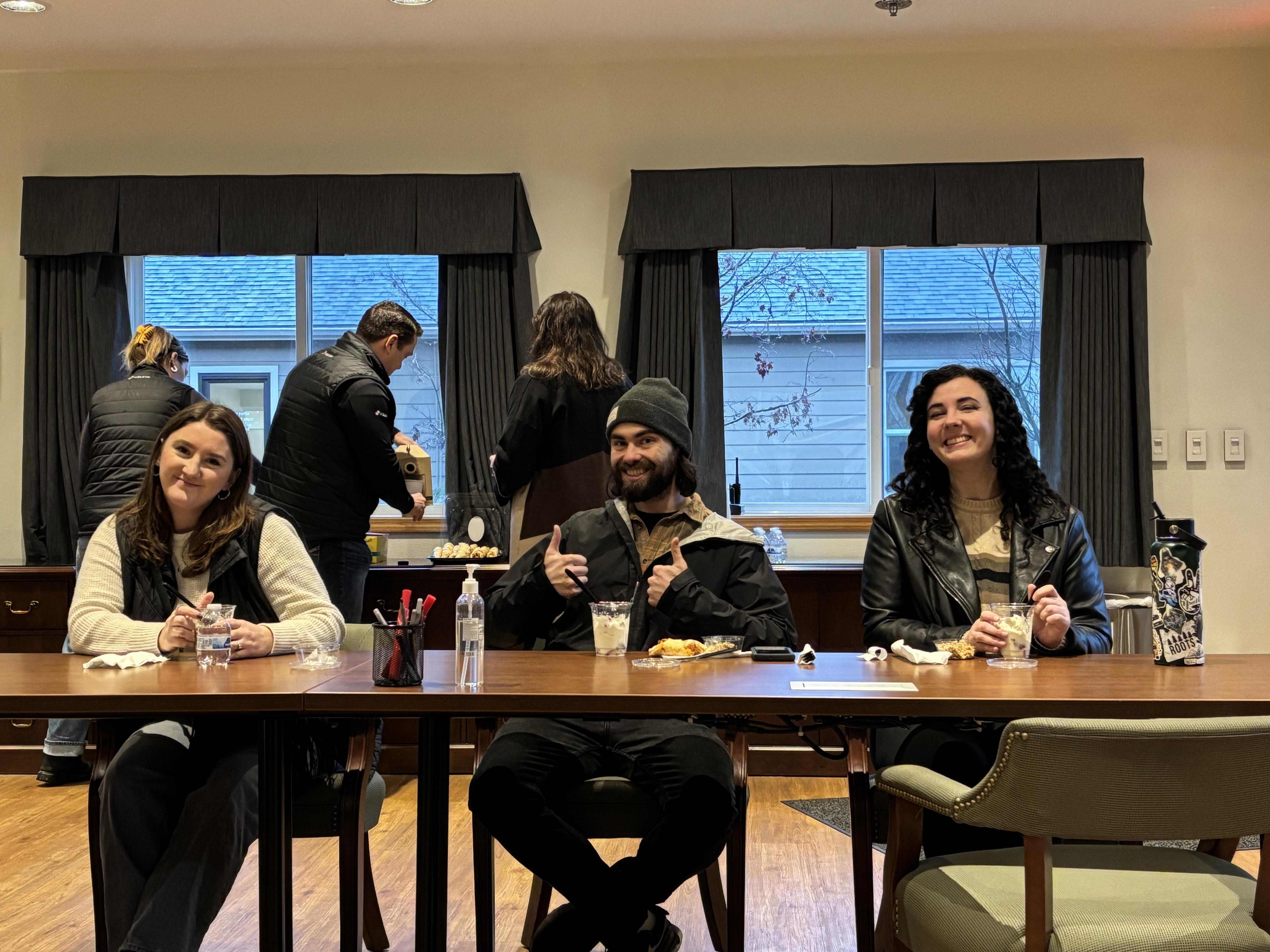 Sustainability initiatives
Sustainability initiatives
Beyond their incredible innovation, Malarkey has continually worked to stand out from the crowd. Alex Tolle, the R-Club coordinator at The Coffee Shops shared, “Malarkey has these amazing, huge innovations, but also small things that you don't think about like the smog granules.
I can't even comprehend the science behind that.” The granules Alex was referring to use a photocatalytic coating to not only divert smog (NO2) but create nutrients for the surrounding natural area.
This scientific and carefully researched approach to sustainability tracks through all of Malarkey’s initiatives. They place an emphasis on what is called “sustainable performance.” This means they aim to not only find a way to use greener materials but also build a stronger shingle that will last longer overall. Mike shared a quick example of this philosophy, saying, “Imagine you have a paper straw. That’s great that it’s not plastic, but if it gets soggy and stops working faster, you’ll have to use more paper straws. And then you’re still using more resources.” In practice in the shingles, this looks like recycling and repurposing initiatives that are not only good for the planet, but they are also good for the products. As they say in their 2024 Sustainability Report, “The first step to making a sustainable shingle is to make it last longer.”
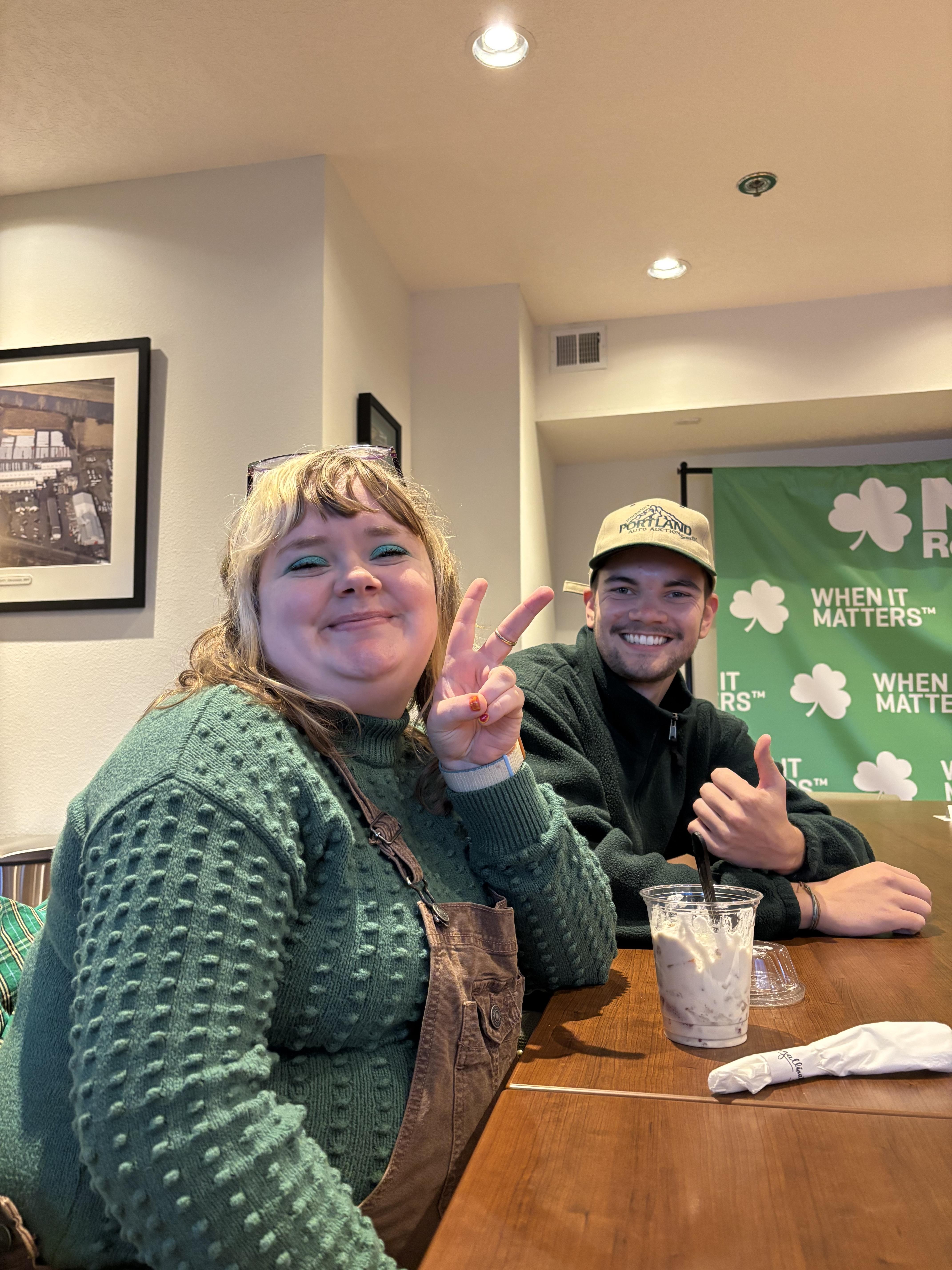 One way Malarkey does this is by partnering with a federal program called Cal Recycle to source old tires from the Los Angeles region that were headed for the landfill. They are then taken and processed into Malarkey shingles (per an average roof of 30 squares, there are five reused tires in the shingles). Not only does this redirect waste from landfills, but the anti-aging ingredient in tires that makes them so black also adds enhanced UV protection to the shingle. Not only is this a greener solution, but it also builds a stronger shingle. Joseph Kaylor, an account manager with The Coffee Shops, shared his reaction to learning about this, saying, “Seeing the breakdown of the shingles and the various sustainability efforts Malarkey makes was super interesting. The upcycling of the tires and smog reduction technology are amazing initiatives, and it was especially interesting how they have designed it to both benefit the consumer and the planet.”
One way Malarkey does this is by partnering with a federal program called Cal Recycle to source old tires from the Los Angeles region that were headed for the landfill. They are then taken and processed into Malarkey shingles (per an average roof of 30 squares, there are five reused tires in the shingles). Not only does this redirect waste from landfills, but the anti-aging ingredient in tires that makes them so black also adds enhanced UV protection to the shingle. Not only is this a greener solution, but it also builds a stronger shingle. Joseph Kaylor, an account manager with The Coffee Shops, shared his reaction to learning about this, saying, “Seeing the breakdown of the shingles and the various sustainability efforts Malarkey makes was super interesting. The upcycling of the tires and smog reduction technology are amazing initiatives, and it was especially interesting how they have designed it to both benefit the consumer and the planet.”
The cherry on top of all of these sustainability initiatives is Malarkey’s efforts to make them accessible. Alex explained, “I feel like some companies might have a really expensive, really nice shingle that’s super eco-friendly and that’s great! But then the cheaper, more affordable option is still bad for the Earth, so a lot of consumers have to go with that one for financial reasons. But at Malarkey, they are saying that all across the board this is our standard and we're not going to go below our standard for anything.”
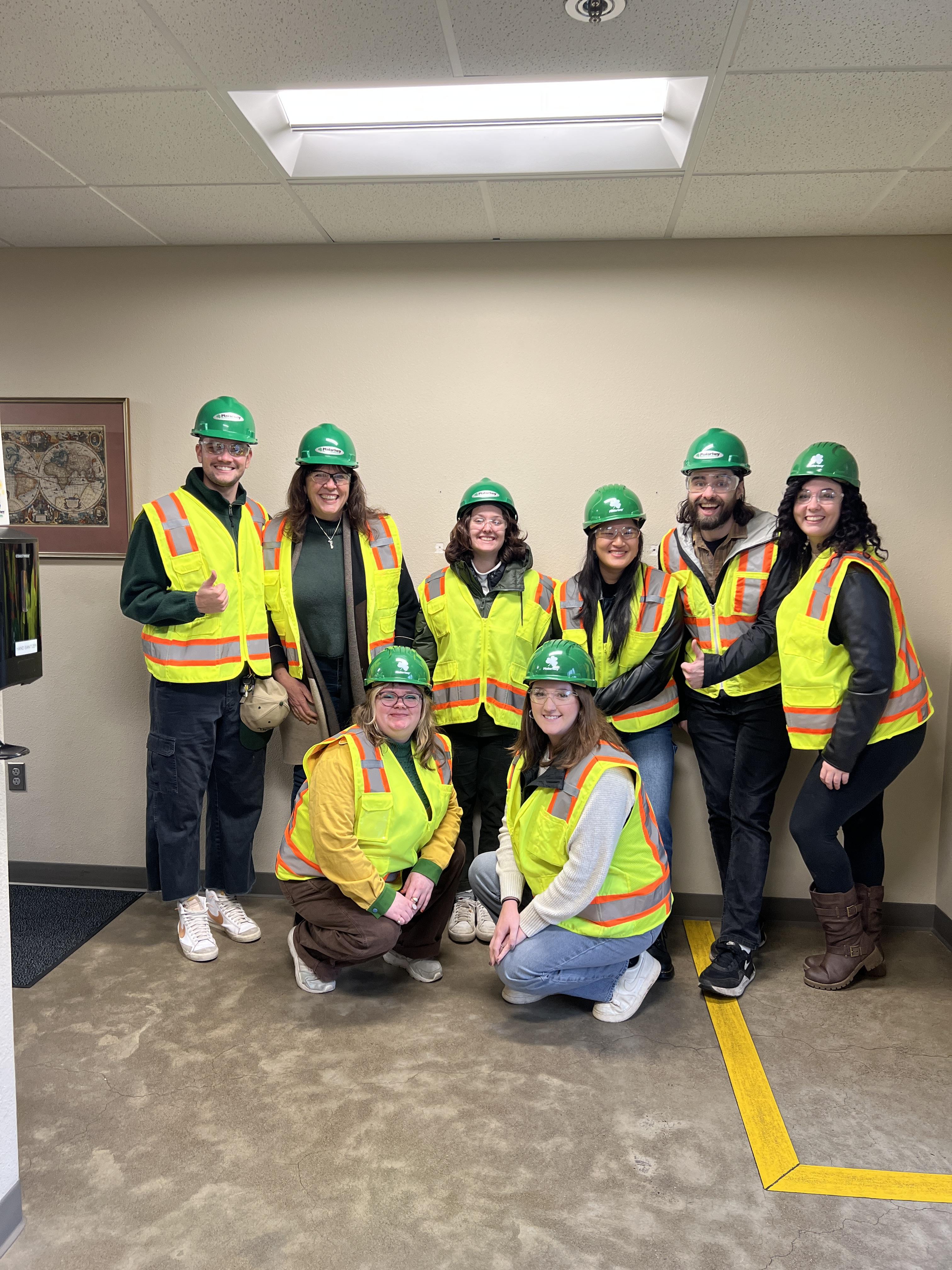 Into the plant
Into the plant
Once Mike and Rachel's presentation was wrapped up, and our crew’s many questions patiently answered, it was time to suit up to head into the factory itself. We started in their fiberglass production line, which Joseph shared some thoughts about, “The most interesting part of the tour for me was the fiberglass at the beginning.
See it all melted down and in a big pot with water and get strung out on a never-ending spool. It felt like we were in Willy Wonka's factory.” From there, we went to see Malarkey’s iconic polymer modified shingles get made.
This is another thing that makes Malarkey stand out from the crowd. Many roof shingle companies manufacture what is called oxidized asphalt. This is a process which begins with a liquid form of asphalt.
From there, you have to blow off all the light oils that are on top of it before it can be processed. This is the traditional way of producing asphalt shingles, but in 2018 Malarkey chose a different path.
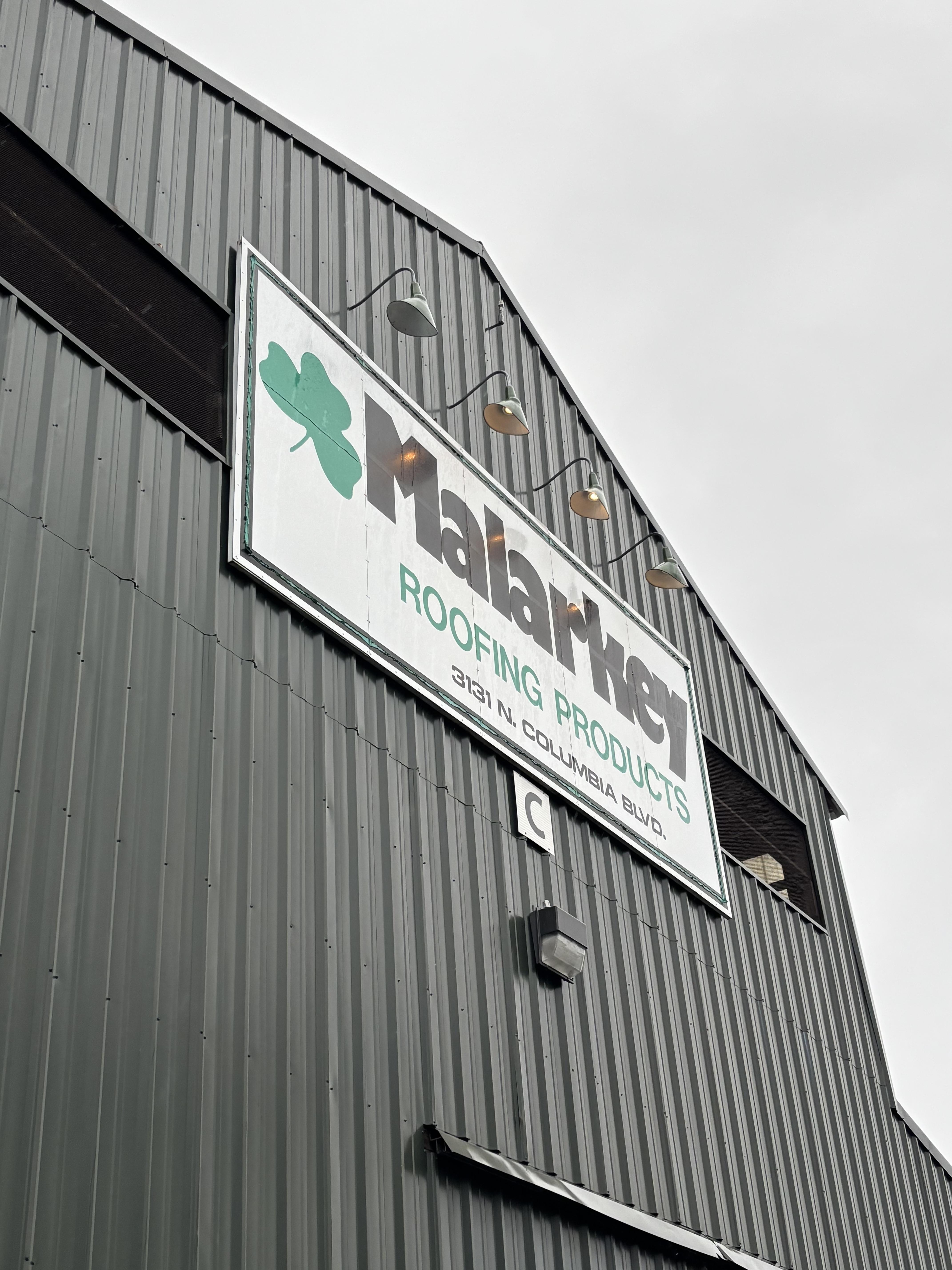 That path was modified polymer asphalt. In this process you do not have to remove the oils from the top of the liquid, instead rubber polymers are added to it. There are some distinct advantages to modified polymer. Going back to Malarkey’s goal to create stronger shingles, modified polymer will last longer than oxidized as the oxidization process prematurely ages the material. Modified polymer is also more durable because of NEX® asphalt technology which enhances "shingle flexibility, resilience and granule adhesion."
That path was modified polymer asphalt. In this process you do not have to remove the oils from the top of the liquid, instead rubber polymers are added to it. There are some distinct advantages to modified polymer. Going back to Malarkey’s goal to create stronger shingles, modified polymer will last longer than oxidized as the oxidization process prematurely ages the material. Modified polymer is also more durable because of NEX® asphalt technology which enhances "shingle flexibility, resilience and granule adhesion."
Getting to learn and see this unique process firsthand was incredible. As Joseph said, it felt as magical as lifting the curtain to Willy Wonka’s factory. One of the biggest takeaways from our visit was how dedicated Malarkey is to their customers, clients, contractors and industry. Hannah put it best, saying, “Malarkey’s values really stood out to me. They strive for excellence and to have the best product available. They continue to innovate and develop interesting new technology.
Learn more about Malarkey Roofing Products in their Coffee Shop Directory or visit www.malarkeyroofing.com.
About Emma
Emma Peterson is a writer at The Coffee Shops and AskARoofer™. Raised in the dreary and fantastical Pacific Northwest, she graduated in 2024 from Pacific University in Oregon with a degree in creative writing and minors in graphic design and Chinese language. Between overthinking everything a little bit, including this bio, she enjoys watching movies with friends, attending concerts and trying to cook new recipes.






















Comments
Leave a Reply
Have an account? Login to leave a comment!
Sign In